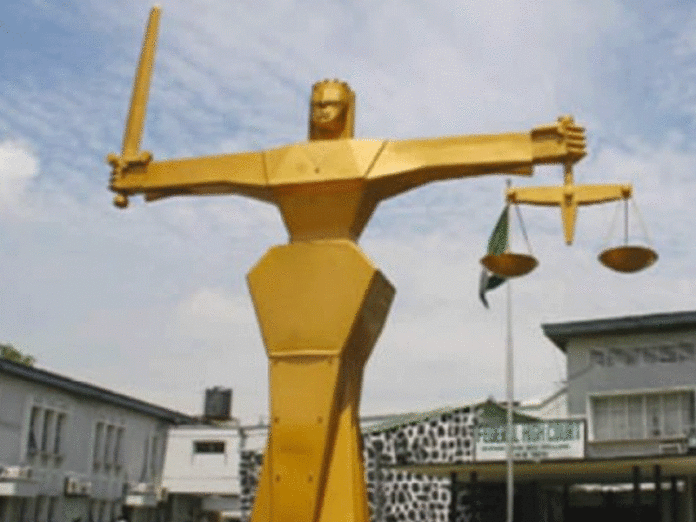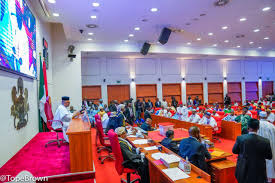By Jude-Ken Ojinnaka
A lawyer and lecturer in the Law department of University of Lagos, Dr Olubunmi Afinowi has charged aggrieved Nigerians whose data and digital rights are breached/ violated to approach the court under the Fundamental Rights Enforcement Procedure (“FREP”) Rules, 2009, for the enforcement of their rights.
Dr Olubunmi Afinowi who is also a research consultant made the charge during a workshop organised by an internationally recognised Lagos-based human rights and advocacy organisation, the Socio-Economic Rights and Accountability Project (SERAP). held in Lagos.
The Workshop/Interactive Session on Promoting Data and Digital Rights in Nigeria was held in Lagos with support from Open Society Foundation (OSF).
It brought together relevant stakeholders in in the data and digital space including journalists, human rights activists, civil society organizations (CSOs), members of SERAP accountability Club (SAC), media organizations, people living with disabilities (PWDs), Bloggers, social media activists/influencers, Nigeria Bar Association (NBA), Federation of Women Lawyers, and professional association.
The event provided an opportunity to participants to build monitoring and advocacy networks to support action in promoting and defending data and digital rights.
The ultimate aim was to ensure the promotion and protection of data and digital rights as fundamental human rights by fostering public support for data and digital rights in Nigeria, as well as the enjoyment of these rights by the people.
READ ALSO
Ajaero rushed to Owerri FMC, right eye completely shut after police manhandling
On the first day, the workshop/ interactive session featured two training topics.
The first topic, ‘Legal Strategies for Promoting Data and Digital Rights in Nigeria’ was tutored by a law lecturer in University of Lagos, Dr Olubunmi Afinowi, while the second topic ‘Media Strategies for Promoting Data and Digital Rights in Nigeria’ was tutored by the Executive Director, Dataphyte, Mr Joshua Olufemi.
Explaining the legal concept of data and digital rights, Dr Afinowi said that
data and digital rights encompass conventional rights translated to digital spaces, data-centred rights, rights to access digital spaces and services, and rights to participate in the governance of the digital or the Internet.
She further explained that an aggrieved Nigerian whose data and digital rights have been breached/violated may approach the court under the Fundamental Rights Enforcement Procedure (“FREP”) Rules, 2009, for the enforcement of his/her rights.
She cited the case of Incorporated Trustees of Digital Right Lawyers Initiative (DRLI) v. L.T. Solutions & Multimedia Limited (LTSM) Unreported, Suit No. AB/83/2020) to buttress the position of the law.
“The fundamental rights guaranteed in the Constitution are worthless unless the citizen has free and unfettered access to the law courts to enforce them. Per Eso JSC in Ransome Kuti and ors v AG Federation”
Dr Afinowi revealed that there is proliferation of agencies or entities unlawfully collecting personal data.
She described sensitive personal data as personal data relating to an individual’s Genetic and biometric data for the purpose of uniquely identifying a natural person; Race or ethnic origin; Religious or similar beliefs; Health status; Sex life; Political opinions or affiliations; Trade union memberships, and other information categorised as sensitive information in line with Section 30.
“But the Act prohibits the processing or allowing to be processed information categorised as sensitive unless with consent of the subject, where it becomes necessary in the interest of the data subject or public interest.
“Consent: means any freely given, specific, informed, and unambiguous indication, whether by a written or oral statement or affirmative action, of an individual’s agreement to the processing of personal data relating to them or to another individual on whose behalf they have the permission to provide such Consent
“Data controller: means an individual, private entity, public commission, agency or any other body who, alone or jointly with others, determines the purposes and means of processing personal data.
“Data processor: means an individual, private entity, public authority, or any other body, who processes personal data on behalf of or at the direction of a data controller or another data processor.
“Data subject: means an individual to whom personal data relates.Personal data: any information relating to an individual who can be identified or identifiable, directly or indirectly, by reference to an identifier such as a name, an identification number, location data or an online identifier or one or more factors specific to the physical, physiological, genetic, psychological, cultural, social or economic identity of that individual.
“Personal data breach: a breach of security of a data controller or data processor leading to or likely to lead to the accidental or unlawful destruction, loss, alteration, unauthorised disclosure of, or access to, personal data transmitted, stored or otherwise processed.
Therefore, digital space and interactions therein have far-reaching implications and ramifications. It affects all facets of human lives across demographics.It is thus pertinent that there must be a governance and regulatory framework within the space. In return, such a framework must recognise, respect and safeguard human rights of all parties.
Lawyers, as ministers in the temples of justice, have a duty to understand this extensive space and sector and to have a good appreciation of the relevant laws, policies and institutional framework. In order to hold the government and its agencies accountable, it is essential that the Lawyer has a level of familiarity and working knowledge of DDR in Nigeria.
The identifiable violations of data and digital rights in Nigeria can be categorised as Citizen to Citizen, Government agencies to Citizen, Citizens to government Agencies, Business entities/Corporations to citizens.
The second topic by Mr Joshua Olufemi dwelt specifically on the role of the media in the DDR space.
These include: “Increased and strategic reporting of digital rights violations, data protection mechanisms, data privacy concerns, and digital surveillance needs further strengthening.
“Advance citizen participation in data and digital rights reforms.
“Evidence-based research to engage tech companies must be fully explored to increase the preservation of digital rights and technological spaces.
“Sustained advocacy with legislative and executive arm by media on Data Privacy and Data protection
“Periodic open-source tools developed in collaboration with civic technological organisations .
He mentioned Bank Verification Number (BVN), National Identity Number (NIN), Subscriber Identity Module (SIM) and Tax Identification Number (TIN) as four common items that can be used to access one’s personal data.
He cautioned against disclosing this items to any other person, saying that they all possess ones biometric signature which can used to access one’s money, message and personal information.
At the end of the workshop, participants were issued with certificate of participation by SERAP.
The second day event was the presentation of the research report titled: “No Place for Dissent, No Privacy: Restrictions on Data and Digital Rights in Nigeria”
The presentation was made by the Research Consultant, Dr Olubunmi Afinowi of Law department, University of Lagos.
The 56-page report comprises the Research design; Analysis; Challenges and issues related to data protection and digital rights in Nigeria; Data analysis and Strategies for promoting access to data protection and digital rights.
Based on the findings, the research proposes policy recommendations and strategies for enhancing access to information, strengthening data protection measures, and safeguarding digital rights in Nigeria.
It provides guidance to stakeholders, including government agencies, civil society organisations, and the private sector, on how to prioritise and implement measures that promote these fundamental rights and protections.
The panel of discussants after the presentation of the report were Kate Henshaw, an award -winning actress and social activist; Mr Gbenga Sesan, the Executive Director, Paradigm Initiative and Mr Babatunde Bamigboye, Head Legal, Enforcement and Regulations, Nigeria Data Protection Commission.













